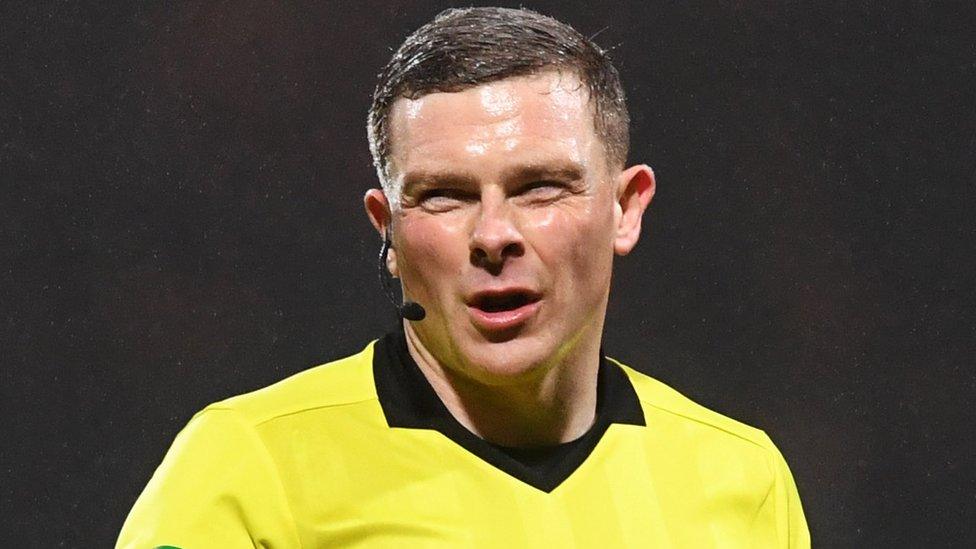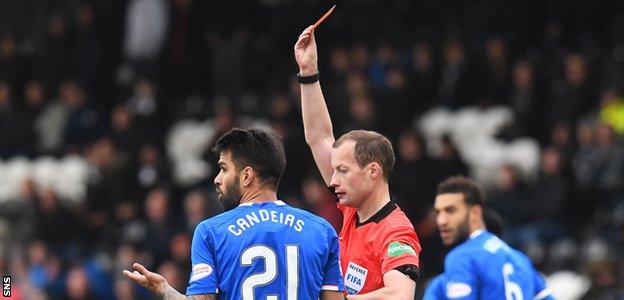Clubs must offer more than words as police step in over referee threats
- Published

John Beaton has been in the headlines
When Police Scotland deems it necessary to give a besieged referee a protective escort in order for him to go to his work then the human reaction is to shake your head and ponder what has become of football in Scotland.
The next instinct is to call for influential people to get together to make sure that John Beaton is the last official in this country to get threatened by an enraged fan, as the referee was on Friday when his personal contact details were leaked online, an act that subsequently led to abusive treatment that was taken sufficiently seriously by police that they stepped in to make sure he got into Somerset Park safely on Saturday to oversee Ayr United's Championship joust with Falkirk.
Few will need reminding of the backdrop here. Beaton, when refereeing the Old Firm game at Ibrox last month, failed to punish Rangers' Alfredo Morelos for three separate incidents involving Scott Brown, Ryan Christie and Anthony Ralston. Outside of the Ibrox bubble, there has been general incredulity at Beaton's lack of action.
Among elements of the Celtic support, legitimate criticism later turned to rage.
Beaton told the Scottish FA that he saw all three incidents in real time and reckoned none were worthy of sanction. The SFA cannot take retrospective action in these circumstances. If their referee says he saw the flashpoint as it happened then his split-second judgement of it takes on a bizarre infallibility in the eyes of the governing body.
What happened next was Old Firm football in microcosm. Celtic folk are fond of poking fun at Rangers' habit of issuing lengthy statements about perceived injustices against their club. In the past few years, the Celtic support has knocked a lot of crack out of 'statement o'clock', the general greeting when another missive comes whizzing out of Ibrox and into the public domain.
Morelos incidents in Old Firm derby
All of this is to conveniently ignore that their own club is partial to a proclamation or two when they see fit. On Friday, Celtic went public with their surprise about the lack of action against Morelos.
As is Glasgow football's wont - among sections in the green and blue corners - Morelos being deemed to have no case to answer was, on the one hand, living proof of referee and SFA incompetence bordering on corruption. On the other hand, it was deemed as justice for the unfairly targeted and highly talented Colombian.
Some more excitable Rangers people constructed a narrative that Morelos was being highlighted not because he's a player whose discipline has let him down far too often but because others fear him on the pitch and want him out of commission, a view which, according to the conspiracy theory, is being stoked by an inherent racism against him on the part of the media.
Refs can't win even if they do speak out
This was standard Old Firm ugliness and irrationality in the wake of a contentious match. The temperature was already pretty high when Celtic issued their statement on Friday.
"Given that the referee took no action at the time, this tends to suggest that such conduct, which in one instance led to a Celtic player, Anthony Ralston, being injured, is acceptable in Scottish football," the club said. "That cannot be right."
The statement went on: "In order to fully understand what is going on, Celtic, our supporters, Scottish clubs and the general Scottish football public need transparency in these matters and we therefore call on the Scottish FA to allow the referee, John Beaton, to explain these decisions publicly as well as any match officials involved in similar circumstances. In the meantime, we have requested a meeting with Scottish FA chief executive Ian Maxwell and the association's head of refereeing."
In a footballing nirvana, referees would come out after games and talk us through their key decisions, what they saw when giving or not giving that red card, when giving or not giving that penalty. They would talk, everybody would listen and then we'd all go away and reflect on what was said.
Supporters would come out with stuff like, "well, I don't agree with Willie Collum's decision to send our guy off while ignoring 18 fouls by their fella, but fair play to him for explaining it". And "all due respect to Andrew Dallas for taking the time to go through why he denied us three stonewall penalties. You can't say fairer than that".
No. If a referee admits an error, he's getting it. If he doesn't admit an error, he's getting it. Calling for Beaton to explain himself is not a serious suggestion, not in Scotland.
It's never going to happen and everybody knows it. It's a sop to angry fans and sometimes those angry fans career over the boundary of what is acceptable until somebody flies into the realms of what is insane and criminal.
And that's what brought us to Friday evening, when Beaton's safety, and the safety of his family, was jeopardised. The SFA issued a statement on Saturday. Apart from expressing concern and support for Beaton, there was a reminder that stakeholders in the Scottish game will gather at a summit at Hampden to discuss the state of affairs at present between clubs and referees and the governing body's overseeing of the game.
That'll be a long meeting and - like many of the statements we've been seeing - utterly futile. A couple of years back, there was another such summit and an uneasy peace lasted a metaphorical blink of an eye before the usual dysfunctional relationship returned.
No doubt this latest version will pore over the usual chestnuts. Why is a player punished for one offence one week and a different player is not punished for the same offence another week? Why is a manager up on a charge for criticising a referee here but a different manager escapes sanction for the same offence there. When is a kick not a kick, a stamp not a stamp, a grope not a grope? When is a red card not a red card?
It's going to be a talking shop, nothing more. Nothing will change. There will be no lasting improvement in relations and no improvement in refereeing performance.
Everybody will shake hands at the end after vowing to try harder to understand the other's point of view - and then all hell will break loose again. You'd need to be irredeemably gullible to think otherwise.
Is VAR not the answer?
It would be nice - and again we're probably flirting with gullibility - if each club was to bring something constructive and something achievable to the table, something that might actually help the situation.
VAR should be at the heart of it. Imperfect, yes. Full-proof, no. But better. A step in the right direction. Are Celtic in favour of, and willing to invest in, VAR, the system that would help reduce the number of refereeing blunders that they and others have railed against?
Their manager, Brendan Rodgers, has said that they would like to see its introduction, but the hierarchy has not had much, if anything, to say. Celtic's suggestion as laid out in their statement is no solution. Morelos got lucky, most observers would say so, but their contribution to the debate is just more noise. There's too much of that already.
Referees coming out and talking about decisions/errors they have made won't stop them making mistakes. Transparency doesn't do anything to address the core problem. It'll just put them in the stocks - all the easier for everybody to pelt them with rotten fruit. Or worse.

Rangers were upset over Candeias' dismissal in Paisley
When Rangers' Daniel Candeias was shown a second yellow card in the latter stages of their win against St Mirren in November, there was confusion as to what it was that referee Willie Collum actually saw when dismissing the Portuguese.
Frankly, several months on, the confusion remains despite the SFA attempting to clear it up. Rangers issued a statement when their call for an appeal was turned down.
Like Celtic's words from Friday, their statement might have sated their supporters, it might have shown their fans that they're defending the club, but what do these things actually achieve? What do they contribute to the greater good? At the top of the club, Rangers, like Celtic, have had nothing to say about VAR.
What outcome are these teams looking for? If the object is to get to a place where referees - all of them, seemingly, receptive to VAR and certainly in need of it - have more support in their efforts to make better decisions that would up the integrity of the competition and lessen the fury of some fans while averting the awful sight of officials being targeted then VAR has to be part of the solution.
As a piece of constructive thinking, it might be no harm if that could be put in one of these statements sometime. The alternative is more mistakes, more rancour, more bitterness, more mayhem.